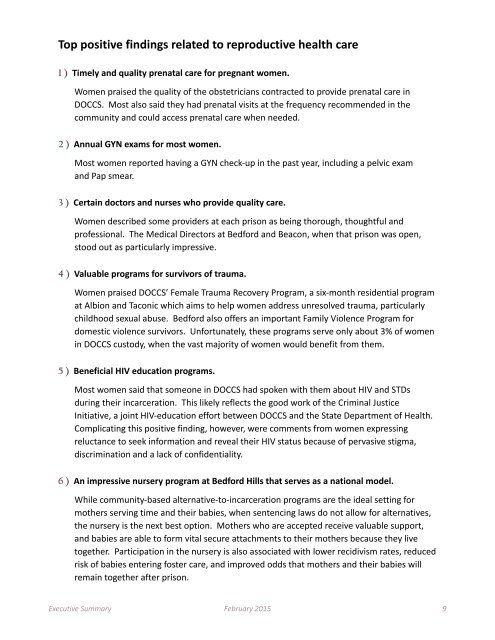Reproductive-Injustice-FULL-REPORT-FINAL-2-11-15
Reproductive-Injustice-FULL-REPORT-FINAL-2-11-15
Reproductive-Injustice-FULL-REPORT-FINAL-2-11-15
Create successful ePaper yourself
Turn your PDF publications into a flip-book with our unique Google optimized e-Paper software.
Top positive findings related to reproductive health care<br />
1 ) Timely and quality prenatal care for pregnant women.<br />
Women praised the quality of the obstetricians contracted to provide prenatal care in<br />
DOCCS. Most also said they had prenatal visits at the frequency recommended in the<br />
community and could access prenatal care when needed.<br />
2 ) Annual GYN exams for most women.<br />
Most women reported having a GYN check-up in the past year, including a pelvic exam<br />
and Pap smear.<br />
3 ) Certain doctors and nurses who provide quality care.<br />
Women described some providers at each prison as being thorough, thoughtful and<br />
professional. The Medical Directors at Bedford and Beacon, when that prison was open,<br />
stood out as particularly impressive.<br />
4 ) Valuable programs for survivors of trauma.<br />
Women praised DOCCS’ Female Trauma Recovery Program, a six-month residential program<br />
at Albion and Taconic which aims to help women address unresolved trauma, particularly<br />
childhood sexual abuse. Bedford also offers an important Family Violence Program for<br />
domestic violence survivors. Unfortunately, these programs serve only about 3% of women<br />
in DOCCS custody, when the vast majority of women would benefit from them.<br />
5 ) Beneficial HIV education programs.<br />
Most women said that someone in DOCCS had spoken with them about HIV and STDs<br />
during their incarceration. This likely reflects the good work of the Criminal Justice<br />
Initiative, a joint HIV-education effort between DOCCS and the State Department of Health.<br />
Complicating this positive finding, however, were comments from women expressing<br />
reluctance to seek information and reveal their HIV status because of pervasive stigma,<br />
discrimination and a lack of confidentiality.<br />
6 ) An impressive nursery program at Bedford Hills that serves as a national model.<br />
While community-based alternative-to-incarceration programs are the ideal setting for<br />
mothers serving time and their babies, when sentencing laws do not allow for alternatives,<br />
the nursery is the next best option. Mothers who are accepted receive valuable support,<br />
and babies are able to form vital secure attachments to their mothers because they live<br />
together. Participation in the nursery is also associated with lower recidivism rates, reduced<br />
risk of babies entering foster care, and improved odds that mothers and their babies will<br />
remain together after prison.<br />
Executive Summary February 20<strong>15</strong> 9


